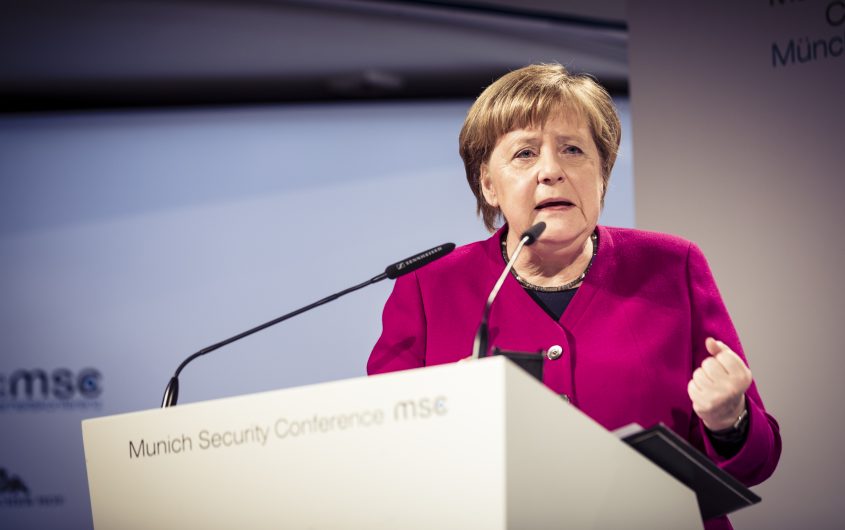
AGI Asks: What is Angela Merkel’s Foreign Policy Legacy?

Andrea Rotter
Hanns-Seidel-Stiftung
Andrea Rotter heads the Foreign and Security Policy Division at the Academy for Politics and Current Affairs of the Hanns Seidel Foundation (HSF) in Munich, Germany. Her research focuses on transatlantic security cooperation as well as German and European security and defense policy. Her current research projects address the evolution of Germany’s strategic culture, the transformation of NATO in the wake of Russia’s war of aggression against Ukraine, and the link between geopolitical rivalry and space security policy. She is a non-resident fellow at AGI.
Prior to joining HSF, she was a researcher in the Americas Research Division at the German Institute for International and Security Affairs (SWP) in Berlin and taught at the Chair of International Politics and Transatlantic Relations at the University of Regensburg. In 2018, she was a visiting fellow at the German Marshall Fund of the United States (GMF) and the American-German Institute (AGI) at Johns Hopkins University in Washington, DC. From 2018-2022, she was a member of the Young Leaders Program of the Federal Academy for Security Policy (BAKS), Berlin, and is an alumna of the International Visiting Leadership Program (U.S. Department of State) and the Manfred Wörner Seminar (GMF & German Federal Ministry of Defense). She is also a member of the extended board of WIIS (Women in International Security) Germany and heads the regional chapter in Munich.
Rotter holds a master’s degree in European-American Studies from the University of Regensburg and a bachelor’s degree in International Cultural and Business Studies from the University of Passau and Stirling, UK.

Aylin Matlé
German Council on Foreign Relations
Aylin Matlé is a senior research fellow in the Center for Security and Defense at DGAP. Previously, she has served as the Deputy Head of the Konrad-Adenauer-Stiftung’s Israel office in Jerusalem.
Aylin Matlé holds a PhD from Martin-Luther-Universität Halle-Wittenberg. Her thesis “Drifting Apart of Transatlantic Security: The American Mark on NATO under Barack Obama” examined the impact of the Obama administration on allied and defense policies of European Alliance members. Dr. Matlé worked as a research associate at the chair of international relations and European politics at the Martin-Luther-Universität from 2014-2016. Prior to that, she completed an MA in War Studies at King’s College London in 2014. She holds a bachelor’s degree in Public Management and Governance from Zeppelin Universität, Friedrichshafen.
She was a Fellow in the American-German Situation Room in 2018. In addition, she participated in the AICGS project “A German-American Dialogue of the Next Generation: Global Responsibility, Joint Engagement” from 2018-2019.

Jana Puglierin
European Council on Foreign Relations
Jana Puglierin was a Fellow in the American-German Situation Room in 2017. She has been the head of ECFR’s Berlin office and a senior policy fellow at the European Council on Foreign Relations since January 2020. She also directs ECFR’s Re:shape Global Europe project, which seeks to develop new strategies for Europeans to understand and engage with the changing international order.
Before joining ECFR, Puglierin headed the Alfred von Oppenheim Center for European Policy Studies at the German Council on Foreign Relations (DGAP). From September 2013 to December 2015 she was a program officer at the DGAP’s Future Forum Berlin (Berliner Forum Zukunft).
Prior to this she was an advisor on disarmament, arms control, and non-proliferation at the German Bundestag, where she also worked on matters relating to German and European foreign and security policy.
Between 2003 and 2010, she worked as a researcher and lecturer in Bonn University's political science and contemporary history department as well as in the University's North American studies program. She also held a teaching post at the University of Chemnitz, and worked as a researcher at the DGAP.
She studied political science, international and European law, and sociology at the University of Bonn, at Venice International University, and at the State University of New York (SUNY) at Albany. Her doctoral degree was based on a thesis on the life and thought of John H. Herz.
AGI Asks:
What is Angela Merkel’s foreign policy legacy?
Aylin Matlé
Konrad-Adenauer-Stiftung
Angela Merkel’s tenure will be remembered for the style rather than the substance of her chancellorship. Hers was a leadership style characterized by reliability, steadiness, and decency when it came to Germany’s foreign and security policies and the country’s place on the world stage. Merkel was not one for taking bold, courageous, or even visionary decisions, with a few exceptions at least on a rhetoric level. One such example was her ‘farewell’ speech at the 2019 Munich Security Conference in which she unmistakably defied the Trump administration’s unilateral ‘America first’ approach by centering her remarks on the power of multilateralism to tackle the most pressing global challenges.
In general, however, her foreign and security legacy lacks a clear direction and even more so a vision. To be sure, Merkel was noticeably clear about wanting to uphold (and in recent days reinvigorating) the transatlantic bond, multilaterally and bilaterally. To that end, she worked towards fulfilling basic ‘duties’ expected of Germany (e.g., committing to NATO’s two percent metric, deploying soldiers to Afghanistan). She was equally eager to further entrench Germany within the European Union and bolstered the country’s place therein tremendously. Yet, both the transatlantic as well as the EU allegiance are deeply rooted in Germany’s foreign and security policy and are as such not a special feature of Merkel’s chancellorship – unlike her leadership style for which she will surely be remembered and missed.
Jana Puglierin
European Council on Foreign Relations
It is not entirely easy to write about Merkel’s legacy in a policy field in which she has been primarily one thing for the past sixteen years: absent! “Hard security” has never been her thing—she has always appeared somewhat aloof from Germany’s armed forces, she rarely spoke out on questions on security and defense, and has remained skeptical about the usefulness of military interventions.
While governing with the Free Democrats from 2009 to 2013, she supported then foreign minister Guido Westerwelle’s “culture of restraint” rule of thumb. After that she has mainly left it to others—the federal president, defense ministers, the chair of the Bundestag’s foreign affairs committee—to loudly advocate that Germany’s growing weight in the world should include a more effective German and European defense policy. On the rare occasions when Merkel issued big public statements about Europe’s growing need to defend itself—such as in the famous beer-tent in 2017—she never spelled out to the German public what this could mean, or how much it would cost.
One of the few security policy initiatives that came directly from the Chancellery was the so-called Ertüchtigungsinitiative (the Enable and Enhance Initiative) whose thrust was to train up and equip trustworthy partners in global trouble spots to enable them to engage in regional security themselves. But its focus on logistical support, training, and arms exports, often earned the Germans the criticism that they were leaving other allies to do the dirty work, such as the actual fighting of terrorists, while Germany stayed comfortably far from the front lines. Where she approved new military interventions, against the Islamic State group and in Mali, she did so primarily out of alliance solidarity.
That does not mean that she’s a pacifist. She has always backed Germany’s commitment to NATO, including the two percent spending target, and supported the development of a European defense union. But she has never dared position herself outside the ponderous security policy status quo in Germany—and she never went out of her way to explain, or even push through, unpopular measures.
Andrea Rotter
Hanns-Seidel-Stiftung
Looking back on her sixteen-year chancellorship, the early assessment of Angela Merkel’s foreign policy legacy offers a mixed balance of undisputed achievements, unfortunate shortcomings, and untapped potential. Most notably, her role as Europe’s crisis manager-in-chief, which was tested several times throughout her tenure and contributed to Europe’s relative stability, stands out against the frequently voiced criticism of “muddling through” rather than pursuing a clear, long-term strategic vision for Germany. Under her leadership, Germany rose to the de facto leader of the European Union, where her integrationist approach to the EU’s Common Security and Defense Policy clashed with French President Macron’s more ambitious and capability-driven plans. While Merkel recognized the need for Europe to step up and take care of its own security, Europe has yet to overcome its self-inflicted inertia. When Donald Trump threatened the rules-based international liberal order, Merkel was designated the new “leader of the free world,” underlining her international reputation as a reliable supporter of free trade, diplomacy, and multilateralism. At the same time, however, Merkel’s Germany became more willing to pragmatically pursue national interests and risk irritating partners as Nord Stream 2 and her policy of equidistance between the United States and China demonstrate.
While Merkel generally kept a low profile in the domestic debate on foreign policy, Germany underwent a visible transformation towards a more active international role. After the controversial UN Security Council abstention on Libya in 2011, the 2014 Munich Consensus indicated a greater willingness in Berlin to assume responsibility on the world stage. Within NATO, for instance, Germany showcased leadership and became an important contributor to the Alliance’s Enhanced Forward Presence following Russia’s annexation of Crimea. Moreover, Germany’s defense spending has increased significantly since 2014, though it’s still a far cry from NATO’s 2 percent goal, and many deficiencies in the Bundeswehr’s equipment and operational readiness remain. Military operations in Afghanistan and Mali notwithstanding, German and international observers alike were frustrated by the persistent reflex to concentrate on the arguably softer aspects of security policy, while letting allies do the harder, more dangerous jobs. Germany’s diplomatic initiatives paid off, as demonstrated by the EU’s sanctions against Russia or efforts to save the JCPOA. Yet in the end, Germany’s foreign policy continued to be torn between serious engagement and remaining in its comfort zone. Merkel’s rationale might have been to strike a balance between what partners expected of Germany and what she believed feasible in the face of a reticent German public. Conflicts inside the grand coalition further added to Berlin’s lethargy. The next chancellor, however, will have to pursue a coherent, proactive strategy rather than settling for crisis management and damage control, if he/she wants to navigate Germany and Europe through the rough waters of geopolitical rivalry.








